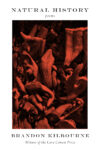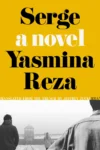Joshua Wheeler is the author of an essay collection, Acid West, and a teacher at Louisiana State University. His debut novel The High Heaven [Graywolf] is a wildly ambitious and supremely poetic work. The story centers on Izzy, a young orphan and cult escapee, who finds herself taken in by New Mexican rancher Oliver Gently, who happens to live next to the White Sands Missile Range. After a tragedy, Izzy embarks on a strange journey that brings her to Texas and New Orleans, where she observes the space race through rapidly evolving television screens and wonders at her place in the cosmos. Joshua Wheeler and I spoke over email about space monkeys, astonishment, and much more.
I hate to be boring and start at the beginning of the novel, but The High Heaven opens with a spectacular scene of a NASA rocket crashing, and rancher Oliver Gently and his father finding a live monkey inside. When did you first become acquainted with the knowledge that NASA once sent monkeys into orbit? And when did you decide that this would open your novel?
When the beginning is absolute absurdity, it’s always best to start there. So that’s why the novel opens at the beginning of the space race in the late forties, after WWII, when America brought Nazi scientists to New Mexico to launch V2 rockets heavenward with monkeys in them. All of that was part of my story before I was even around, NASA and monkeys and rockets and cattle and atom bombs. That’s just where I’m from. So I guess I’ve known about this stuff since my own beginning. My grandaddy worked out at the White Sands Missile Range where they launched those V2s. He worked out there with my uncle GB starting in maybe the early sixties. GB ran the ranch. He would work on the missile range during the day and then go work the cattle on nights and weekends. Sundays they held church at the ranch for decades. When I was a kid in the eighties they were all mostly retired but the after-service conversations I heard were just as often about missiles and rockets as they were cattle or Jesus.
To give you a sense of how tied this region is to the origins of space travel: the grave of Ham the Astrochimp, the first great ape sent to space in 1961, is just blocks from the home I grew up in, at the International Museum of Space History. This grave was a frequent point of pilgrimage in my youth, for breaking arms on skateboards or smooching girls in replica orbiter pods or smoking joints at sunset. Lots of fun stuff that was supposedly bad for you happened around Ham’s grave.
But anyway, the prologue of this novel is based on the Alberts—these were the earliest rhesus monkeys sent up in V2 rockets over New Mexico, all named Albert. Like all things fired off on the missile range, those rockets mostly crashed. It was not uncommon for missiles to crash on the ranch. There were some wild stories about what all crashed on the ranch, some more exaggerated than others, but all entertaining. So I guess that’s why I started there. It’s entertaining. And it’s pretty close to the true things that happened even if it’s not an exact account of how it went down. Plus it’s just the absolute height of the absurdity of human hubris, so the story could really go anywhere from there.
The book’s narrative structure uses Izzy Gently’s viewings of the space race as temporal markers. It gives the impression of breaking up history through the lens of scientific exploration and mass televised events. Can you speak on how you see these things as essential to charting American (or maybe specifically Western) history, post-WWII?
The golden age of the television broadcast medium tracks pretty closely with the golden age of NASA, roughly 1940s to 1990s. Those sciences evolved not just simultaneously but also intertwinedly—the space race was engineered to be good for television and the television broadcast was engineered to show the space race better. And both spaceships and television are, as far as I can see, these gigantic technological efforts at transcending the limits of human nature. They’re on par with the technology of traditional Westerns, the railroad and the telegram, in terms of two technologies working in tandem to transform America. But like the railroad and telegram, spaceships and television are also now kind of quaint. Retro. So that element is always interesting to me. Like, ok, there’s this absolute cultural/scientific miracle that we cannot even now really duplicate: an astronaut bouncing on the moon and his image beamed to the majority of humanity simultaneously via little boxes in their homes and humanity all rapt and gathered around the boxes yearning together for the heavens. But now when you see pictures of that era it’s all so passe or archaic or vintage even though it’s now beyond our capability.
There’s this photo I love of Pope Paul VI watching the moon landing on TV in’69 and blessing the TV in order to bless the moon and bless the men on it. That photo blows my mind because none of that is possible now. The media dominance is impossible. The technological dominance is impossible. The cultural dominance is impossible. That’s probably for the best. But anyway the American hunger for novel cultural entertainment was one major driver that got us to the moon (along with bloodthirsty hunger for military power, of course) but that’s also why we never went back. It got boring, not for the scientists, but for the television viewer.
Going off that, I was struck by the frequent use of proper brand names for the televisions and radios Izzy uses—i.e. the Galaxy, the Trinitron. Beyond accuracy, what drew you to chart this evolution of electronics in America?
Aren’t they such great names? The Predicta and the Dimensia, etc. The Trinitron. I might have named the book Trinitron-something-or-other if Sony wasn’t so litigious. But the names… I guess they’re just marketing gimmicks, yet they do tell you so much about a culture’s aspiration and ideals. I also think a lot of the model names in the novel are just words that Izzy is drawn to because of her particular obsessions. The material stuff a person desires tells you a lot about who they are and so I tried to pay attention to the particulars of the stuff Izzy wanted, even if she was often unsure about how to desire any of the important immaterial stuff, like love or happiness. It’s like when Janis prayed “Oh Lord won’t you buy me a Mercedez Benz”. We all know she was really just asking if she could stop suffering so much. But that ain’t so fun to sing.
There is a kind of story within a story here, the imaginary Western “High Heaven.” I thought it was really successfully woven into the novel’s larger narrative. How did you approach crafting a fictional film that is in conversation with the plot of your novel?
There have been lots of Westerns shot in that area of New Mexico. I was thinking a lot of Clint Eastwood’s Hang ‘Em High, which was in reality shot all around the ranch in the era that Izzy is a kid. But I was also drawing on the big television Westerns of the era, like Gunsmoke or Bonanza. These shows really aspired to capture the whole American mythos, which is of course impossible. So it’s that kind of hubris again, like the space race. Like any genre or collection of tropes could ever approximate the grand diversity of the American experience. In that way the Western is the most appropriate genre for writing about space exploration. But anyway, I don’t feel like the novel really gets too deep into specifics of the plot of the fictional High Heaven, which starts as a TV series but eventually becomes a terrible film with cult status. The novel is maybe more interested in the ways the series gets regurgitated through the culture over the course of Izzy’s life, and interested most of all in how even the most terrible manifestations of culture, like a shitty Western show turned B-movie, can hold great personal meaning for someone.
Izzy and her boyfriend Abel run a number of business scams in Texas by advertising a service and then rejecting potential clients until these people are essentially begging to be swindled. What is it about scams of this variety that interests you? And what do you think are the key similarities and differences between scams and cults, if any? I was frequently nervous that these cons would lead Izzy to her cult roots.
Izzy’s experiences with the so-called Spirit Energy Corporation surely inform the way she approaches the moonless later in life. So you’re on to something there. She’s internalized cult stuff that can’t help but seep into how she approaches life. I guess any good scam is also kind of like a cult—like you really gotta get people to believe for the swindle to do gown. Many cults are, if not scams, then schemes of the pyramid variety, dependent on converting others. But a scheme is not necessarily a scam and there are many true believers walking among us and I often long to be one of them. It’s possible to use the tools of cults and schemes for moral goods, though it doesn’t happen as often as it should. I think that’s something Izzy’s trying to figure out along her journey.
There is an interesting tension in the book involving spectacle and faith. Characters seem to suffer as they go numb to the pain of their past and lose their sense of wonderment. There is a beautiful line about Izzy “cowering in the back of her brain” after everything she’s been through. Yet there is also some critique of the American obsession with manifest destiny, and of course an example of faith gone too far in the La Luz cult. Could you speak on this duality? And what does the word astonishment mean to you? I noticed it popped up quite frequently and eloquently. Is it a particularly religious word to you?
The latter question is especially good and I think actually everyone should be required to routinely explain their personal notion of astonishment. I guess I think that humans having the capacity for astonishment is one of the most beautiful things about us. But sometimes we mistake novelty for astonishment. We were astonished by the space race until it was no longer novel and then we were bored. Annie Dillard’s got this line in her famous essay “Total Eclipse”—she says, “We were born and bored at a stroke.” Yup. But novelty is not a prerequisite for astonishment and in fact I think the best kind of astonishment comes from becoming more familiar with something, anything, until that familiarity is so high that it yields revelation. We’ve been so hungry to consume more and colonize more because the obtaining of new things or new experiences gives you a quick hit of something like astonishment. But lasting astonishment comes, maybe, from the ability to become more and more familiar with what’s at hand. Putting in the work to become that intimately familiar will eventually lead to discovery, and therefore novelty—that old adage: make the familiar strange by paying attention—but in the wake of that kind of discovery-via-attention there is not so much ruin because you are now so intimately connected to the path that led you to the revelation. I guess that does end up sounding religious doesn’t it? Spiritual, at least. Anyway. Go forth and hold still to be astonished slowly by paying attention.
When you say that astonishment can be “becoming more familiar with something… until that familiarity is so high that it yields revelation,” it made me think of the references to paying attention to one’s past throughout the novel. I’m thinking of the line: “When the beacon of original violence is dimmed, so too the beauty of what persevered by its light.” Do you think we can or need to be astonished by our past? Does “discovery-via-attention” apply to ourselves? I’m also thinking of when Maude says, “if you wrap it up dirty, the pain will never go away.” Is healing the same as paying attention, for you?
I suppose healing requires paying attention, though it also requires more than that. And paying attention is just as likely to lead to something less positive than healing, if you don’t do it right. But, to think through some of this in Izzy’s perspective: she’s promised a certain kind of future by the religion she grows up in: a destiny, if you will. And so I think she’s always trying to track the signs of that, trying to figure out if she’s been lied to about her destiny or if all of life is really adding up to anything at all. And at times she gives up on paying attention in this way, partly because she knows that the revelations that come from paying attention aren’t always positive. Like we talked about with the cults, their tactics are not in and of themselves a moral bad or good. With paying attention, that could lead to healing or that could lead to paranoia. And Izzy sees that latter trajectory as a kid at the ranch. But, if you’re asking me, then I’d say in general it is a good idea to try and learn lessons from history, which requires not just knowing history, but working always to know history better, to get closer to the truth of it. And that probably applies on a personal level too. Izzy gets interested, later in life, in having people tell their personal stories in new ways, from new perspectives, and that’s about paying attention to what truths of their pasts they might have missed along the way.
You say in your author’s note that a few details of the story’s premise were taken from your own family history. Did you find it difficult to take liberties when the telling of a personal narrative was at stake? Was there ever a moment when you felt tempted to write something closer to autofiction?
I try to make clear that the novel is fiction but for some reason people don’t believe me. For instance, I do not think moonlessness is an actual condition. Not yet, anyway. The novel is inspired by stories I know from my life in this strange and beautiful region of New Mexico, but I’m not telling any specific person’s story.
I do also write nonfiction that is heavily researched and reported, like in my essay collection Acid West (also about this region of New Mexico), and for sure in that kind of nonfiction writing I do feel anxiety about getting it right and trying not to take too much liberty while also striving to create something artful. But to answer your question definitively: no, I am not tempted to write autofiction. If a reader is interested in me being artfully essayistic about my life and the things I’ve experienced or am obsessed with, then they can read my artfully essayistic nonfiction. I’m being harsh, I guess, but I mean to be. Autofiction is a scam and a cult, not to mention also a scheme, perpetrated by cowardly editors and marketers, and maybe even some writers, who think their readers are not intellectually capable of receiving the truth in an artful manner. The whole notion of autofiction contains both an unnecessary limitation on the possibilities of memoir and an unnecessary veneration of the novel as the ultimate literary art. What a scam.
Emily Saso is a writer based in New York City. Her writing has appeared in Electric Literature, Public Books, Bellevue Literary Review, LitMag, and Harpur Palate, and she conducts interviews for Full Stop Magazine. Her work has been supported by the Granta Writers’ Workshop, the Fine Arts Work Center, and the New York State Summer Writers Institute.
This post may contain affiliate links.






